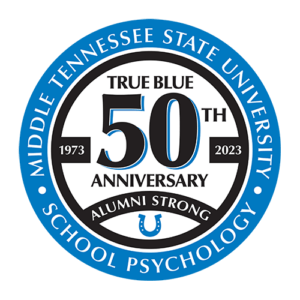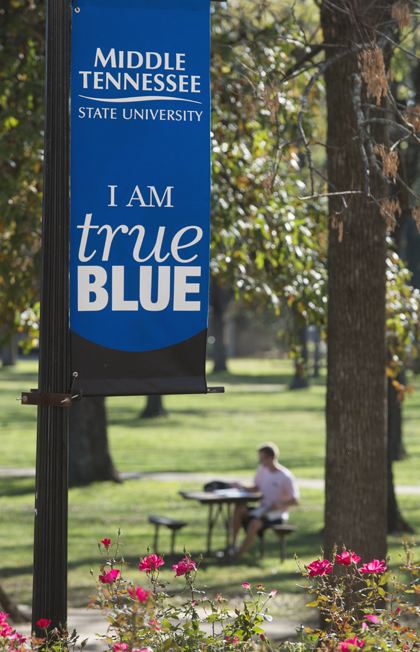
Psychology
Become a licensed School Psychologist and prepare for a rewarding career supporting students' academic and emotional needs.
Psychology, Pre-Specialist in Education: School Psychology Concentration, M.A.
School Psychologists work in collaboration with teachers, parents, and other school personnel to meet the academic, social, behavioral, and emotional needs of students in grades pre-school-high school. The School Psychology program at Middle Tennessee State University offers a combined M.A. and Ed.S. program that leads to licensure as a School Psychologist through the Tennessee Department of Education. The curriculum entails 65 credit hours of on-campus courses, school-based practica, and a year-long capstone internship in the schools.
Courses and fieldwork components prepare graduates of the program to provide evidence-based assessment, consultation, and intervention services in a school setting. The National Association of School Psychologists (NASP) first approved the program in 1991 and 2023 marked the program's 50th anniversary.
Watch our 50th anniversary video here.

Starting Internships and New Jobs!!
2024-2025 Internship Locations:
- Carrollton Farmers Branch Independent School District, Carrollton Texas (1)
- Lee’s Summit R-7 Schools- Kansas City, Missouri (1)
- Murfreesboro City Schools (2)
- Metro-Nashville Public Schools (3)
- Rutherford County Public Schools (1)
- Williamson County Schools (1)
2024 Graduate Job Placements:
- Widefield District 3, Colorado Springs, Colorado (1)
- Dickson County Schools, Tennessee (1)
- Garfield Heights City Schools, Cleveland, Ohio (1)
- Metro Nashville Public Schools, Tennessee (2)
- Murfreesboro City Schools, Tennessee (1)
- Rutherford County Schools, Tennessee (1)
- Toole County School District, Utah (1)
- Williamson County Schools, Tennessee (2)
News Briefs

We’ve Been Celebrating!
Over 150 alumni, family members, and MTSU faculty and staff filled the atrium of ACB on September 9 to celebrate our 50th anniversary and honor the 48- year career of program founder, Dr. James O. Rust. Photo to the left shows current and past program faculty and alumni that graduated between 1978 and 2023 who were on hand for the photo shoot.

Collecting Data!
Yep, it’s that time again. It rolls around every five to seven years. This fall, we started the 2-year data collection cycle that is part of the NASP (National Association of School Psychologists) approval process. Self-study materials are due September 2025 and NASP reviewers will conduct a site visit in 2026. We have been recognized as a fully approved program since 1991 and maintaining this status is core to our identity as a program and the training we provide. Graduates of NASP approved programs are eligible for the NCSP (National Certification as a School Psychologist).
News Briefs
We’ve Been Celebrating!

Over 150 alumni, family members, and MTSU faculty and staff filled the atrium of ACB on September 9 to celebrate our 50th anniversary and honor the 48- year career of program founder, Dr. James O. Rust. Photo to the left shows current and past program faculty and alumni that graduated between 1978 and 2023 who were on hand for the photo shoot.
Collecting Data!

Yep, it’s that time again. It rolls around every five to seven years. This fall, we started the 2-year data collection cycle that is part of the NASP (National Association of School Psychologists) approval process. Self-study materials are due September 2025 and NASP reviewers will conduct a site visit in 2026. We have been recognized as a fully approved program since 1991 and maintaining this status is core to our identity as a program and the training we provide. Graduates of NASP approved programs are eligible for the NCSP (National Certification as a School Psychologist).
Related Media

MTSU graduates are employed in education as either school psychologists or behavioral analysts. A school psychologist may work in a variety of different environments including public schools, clinics and hospitals, private schools, school health clinics, universities, community agencies, and in private practice.
Employers of MTSU alumni include
- Bedford County Schools
- Cartersville (Ga.) Schools
- Cave City (Ark.) School District
- Coffee County Schools
- Dickson County Schools
- Knoxville City Schools
- Lewis County Schools
- McMinn County Schools
- Metro-Nashville Public Schools
- Murfreesboro City Schools
- Rutherford County School
- Sumner County Schools
- Tennessee Department of Education
- Vancouver (Wash.) Public Schools
- Warren County Schools
- Williamson County Schools
- Wilson County Schools



Application supplemental forms
- Supplemental School Psychology application
- Three letters of reference (School Psychology Reference Form)
- School Psychology Student Guide
Associated Links
- National Association of School Psychologists
- Data Base of School Psychology Programs
- Tennessee Association of School Psychologists
Sources for Funding
- Graduate Assistantship Program & Application (MTSU)
- Scholarships, Research Awards, and Loan Forgiveness (NASP)
- Funding Opportunities for Graduate Students (NASP)
Professional Licensure Disclosure
The combined Master of Arts (M.A.) in Psychology and Specialist in Education (Ed.S.) in Curriculum and Instruction with concentration in School Psychology at Middle Tennessee State University (MSTU) is approved by the National Association of School Psychologists (NASP) and approved for licensure by the Tennessee Department of Education. Students should be aware that licensure requirements vary from state to state and are subject to change. MTSU has not made a determination whether this program will meet all of the requirements of another US state or territory. MTSU recommends that students who plan to seek licensure outside the state of Tennessee contact the appropriate licensing agency and discuss their plans with their advisor. To obtain current information about each state’s and territory’s licensure requirements and any additional regulations, students should consult the US Department of Education’s website for state contacts at https://www2.ed.gov/about/contacts/state/index.html, the NASP listing of state school psychology requirements at https://www.nasponline.org/standards-and-certification/state-school-psychology-credentialing-requirements, and discuss their plans with their advisor.
Graduates of MTSU’s combined MA-EdS program are eligible for the Nationally Certified School Psychologist credential from the National School Psychology Certification Board of the National Association of School Psychologists. Students seeking national certification should consult the NASP website at https://www.nasponline.org/standards-and-certification/national-certification and their advisor.

CONTACT US

Please fill in the form below and we will contact you very soon















